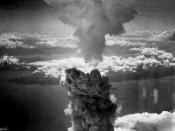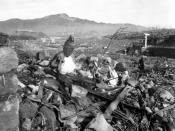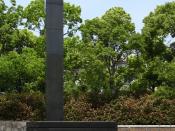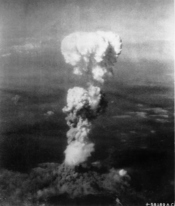hi The Motives Behind the Atomic Bomb Stephen Lott Barbe, 2nd DBQ Since America dropped the first atomic bomb over Hiroshima on August 6th, 1945, a blanket of fear has floated and covered over all the nations of the world. The day of Hiroshima's annihilation was the day people worldwide realized that one nation could have the power to destroy millions in the flip of a switch. It has been said that the United States' decision to drop an atomic bomb on Hiroshima was a diplomatic measure calculated to intimidate the Soviet Union in the pos-Second-World-War era, rather than a strictly military measure designed to force Japan's unconditional surrender. While this statement is correct, it is also flawed in that the American decision to drop the bomb over Japan was arguably crucial to the Japanese's surrender of the war.
Without the dropping of the Atomic bomb over Japan, Japan may have had the opportunity to come back in one final massive attack on America.
As Secretary of War Henry L. Stimson stated, "In such an event the Allies would be faced with the enormous task of destroying an armed force of five million men and five thousand suicide aircraft, belonging to a race which had already amply demonstrated its ability to fight literally to the death." (Document A). If America had not crippled Japan at the time it did so, the war might have been turned completely around and the Allies would of faced a chance of defeat. With the use of an atomic bomb, the concern of an Ally invasion into Japan was exterminated. If the Allies would of invaded Japan as they had in Normandy, the loss of American and Ally lives would have been extremely severe. It was also noted that the Germans and the Axis powers had been working on a similar version of the atomic bomb, which was actually very close to completion at the time of the bombing of Hiroshima. As President Truman said in a radio address in 1945, "We know now how close they were to finding [an atomic bomb]. And we know the disaster which would of come to this nation, and to all peaceful nations, to all civilizations, if they had found it first." (Document H).
The invention of the atomic bomb ended America's war with Japan in two violent explosions. However, not only was the bomb used to save American lives and end World War II, the atomic bomb also was used to intimidate the Soviet Union in the post-world -war. Some, such as General H. H. Arnold, believed that the war with Japan was already coming to a close and the dropping of an atomic bomb would serve little to no use dealing with the surrender of Japan. "It has always appeared to us that, atomic bomb or no atomic bomb, the Japanese were already on the verge of collapse." (Document B). The atomic bomb must have served some greater purpose then to simply draw the end of a war that was already on its final lap. In nuclear physicist Leo Szilard's recollection of a 1945 meeting with James Byrnes, he states "Mr. Byrnes was much concerned about the spreading of Russian influence in Europeâ¦his view was that our possessing and demonstrating the bomb would make Russia more manageable in Europe..." (Document F). Winston Churchill also recalls similar ideas in his recollections of news received during the Potsdam Conference. "It is quite clear that the United States do not at this present time desire Russian participation in the war against Japan." (Document E). With the use of the atomic bomb, the war was over immediately shutting out the Soviet's from entering the war, which is what the American government did not want.
The use of the Atomic Bomb in the war was devastating. Millions of innocent Japanese lost their lives for, what many believe, an American power symbol. The atomic bomb gave the United States and Allies more power than they have ever had before. All other opposing nations feared what they could do, and because of this, avoided interfering with American life. The bomb effectively intimidated the rest of the world in such a way that for the next decade and a half, no other nation even dared to look out way. That is, until the Soviet Union also began to build their own weapons of mass destruction. This race of arms eventually led to the cold war, and marked the beginning of a time of great fear and silence.





